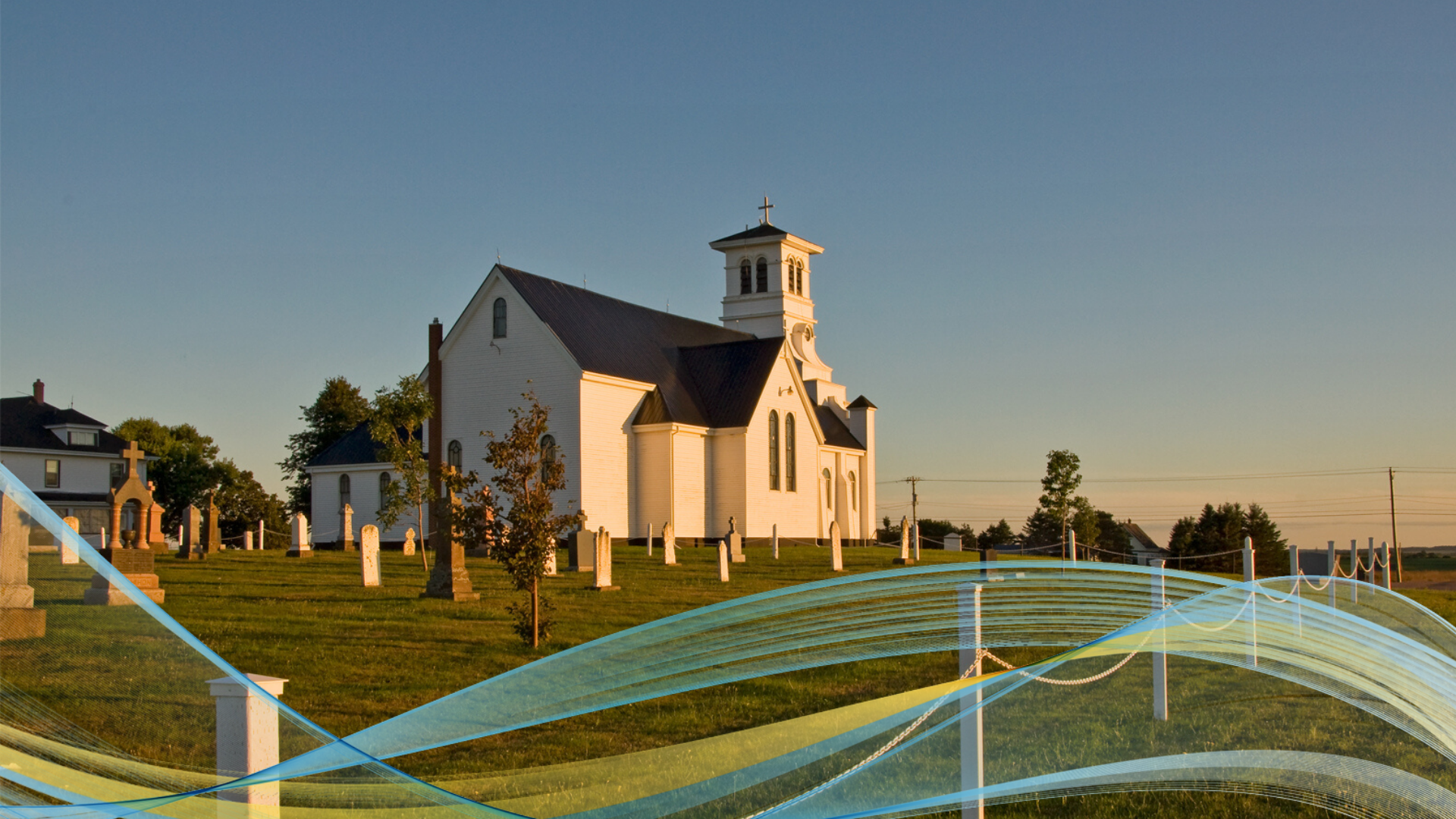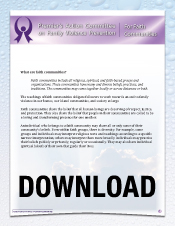Faith communities include all religious, spiritual, and faith-based groups and organizations. Across Prince Edward Island, there are diverse beliefs, practices and traditions with communities that come together locally or across distances or both.
Faith communities share the belief that all human beings deserve respect, justice and protection; people in these communities are called to be a loving and transforming presence for one another.
An individual who belongs to a faith community may share all or only some of one's community beliefs. Even within faith groups, there is diversity. For example, some groups and individuals may interpret religious texts and teachings according to a specific narrow interpretation; others may interpret them more broadly. Individuals may practice their beliefs publicly or privately, regularly or occasionally. Some individuals have their own spiritual beliefs for guidance.
What faith communities say about family violence
Religious values of justice and the equality of persons affirm the dignity and worth of every human being. These values support the right of each person to live without fear and threat of violence.
All of the earth’s major faith communities affirm the value of people. All the major sacred and religious writings promote love and compassion and condemn violence. Yet family violence still affects people in all faith communities.
Among its followers, every faith community has men, women, and children who have experienced or are experiencing family violence. Every faith community likely includes both abusers and people who have been or are being abused.
Family violence harms the spiritual development of those involved. It may cause pain and division in their faith community.
A few examples of teachings from faith traditions practiced on PEI include:
It would be more acceptable in My sight for a person to harm one of My own sons or relatives rather than inflict injury upon any soul. (Baha’i. Bahá'u'lláh, quoted by Shoghi Effendi in God Passes By)
There is no fear in love, but perfect love casts out fear; for fear has to do with punishment, and whoever fears has not reached perfection in love. (Christian. New Testament 1 John 4:16-19)
The moral human being finds the moral law beginning in the relation between man and woman, but ending in the vast reaches of the universe. (Confucianism. Doctrine of the Mean 12)
Among His signs is that He created spouses for you among yourselves that you may console yourselves with them. He has planted affection and mercy between you. (Islam. Qur'an 30.21)
Some individuals’ beliefs doubt or reject the existence of God or a greater spiritual reality; describing themselves as rationalists, secularists, humanists, agnostics or atheists. Although these belief systems do not usually bring people together in communities, individuals who hold these beliefs usually share strong ethics that promote love and care and reject violence.
Download the 2013 Faith Communities Guidebook
Help Prevent and End Family Violence - A Vision for Faith Communities
- Become a sanctuary. Make your place of worship or of gathering a safe place for victims of family violence. Display materials that include available resources for both victims and abusers. Let your community members know that faith leaders are there to help.
- Educate yourself. Study the problem, understand the issues, and learn what you can do. Get training from professionals in the fields of dating violence, domestic violence, child abuse, sexual assault, emotional abuse, abuse of older adults, neglect, and criminal harassment. Learn about the risk factors and warning signs of abuse. Review materials designed to assist faith communities with issues related to violence in relationships.
- Get involved in prevention. Routinely include information on family violence in bulletins or newsletters, on bulletin boards, and in marriage preparation classes. Discuss issues around anger, power, control and the use of violence in its many forms. Invite a guest speaker to talk about family violence or sponsor an educational seminar on the issue. Encourage community members to get involved.
- Break the silence. A faith leader can have a powerful impact on people's attitudes and beliefs. Speak out on family violence from the pulpit and in prayer. Be an advocate for informing others on how to recognize abuse and where to go for help. Leadership is also important on public policy issues such as funding for supports and changes in criminal law.
- Lead by example. Volunteer and support your local transition house, family violence outreach service, or violence prevention program. Train to become a crisis volunteer or seek out ways to support those who are doing the work.
- Partner with existing resources. Faith communities can help those who are experiencing family violence by working together with PEI Family Violence Prevention Services, Victim Services, Child and Family Services, Turning Point program for abusers, police, and others in the broader community whose job is to respond to family violence.
- Offer meeting space to an existing support program or resource. Victims sometimes need a safe place to meet with supporters and parents sometimes need a safe site for supervised visits. Donate to a local organization providing services to victims of family violence. Volunteer your time with a local treatment program for abusers. Find out from different resources and agencies what kinds of support and donations they most need and invite your community members to participate in meeting those needs.
- Support professional training. Encourage and support family violence training and education for faith leaders, clergy, lay ministers, chaplains, and those studying for religious leadership. When abuse is the issue, ignorance can aggravate the problem and further endanger victims.
- Address internal issues. Encourage continued efforts by faith institutions and communities to appropriately respond to all allegations of abuse. These efforts must be taken seriously and acted upon in a timely and appropriate manner. By modelling appropriate action, the faith institution or community promotes the rights of safety and security for all persons.
Learn more about services that can help:


